Oct. 24: Dual Talk Event on Indigenous Food Sovereignty with Mariaelena Huambachano and American Youth Food Justice with Morten Nielsen
Wednesday, October 24, 2018 11:30 a.m. – 1:00 p.m. Room 254, Henry Angus Building (ANGU), UBC
Indigenous Food Sovereignty and Wellbeing in Aotearoa New Zealand and Peru: ‘He kai kei aku ringa’—“the food is in my hand”

Dr. Mariaelena Huambachano
In this talk, Dr. Huambachano explains how Indigenous peoples across New Zealand and Peru have maintained their food sovereignty post-colonization. She will introduce the “Khipu Model” and explain how Indigenous peoples use it as a knowledge and research framework for understanding and controlling their food under current food systems. The talk will also feature her recent research and interviews with the Māori people of Aotearoa and Quechua peoples of Peru as she explains how this new framework can aid in Indigenous resurgence, advocacy, and policy change.
About Dr. Mariaelena Huambachano
Mariaelena Huambachano, (PhD) is an Assistant Professor of Indigenous Studies and Sustainability at California State University, Northridge. Her work focuses on transformational alternatives to tackle global issues. Her interdisciplinary research combines Indigenous and decolonial studies, environmental studies, sustainable development, and public policy to foster the advancement of food sovereignty, social and environmental justice. She is currently working on a book project entitled “Indigenous Food Sovereignty, Sustainability, and Justice” and an international community-based project entitle “Our Rights to Food.”
Pedagogy, Learning and Identity Construction in the American Youth Food Justice Movement
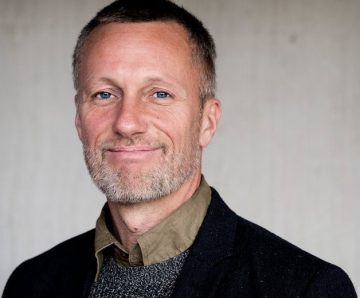
Dr. Morten Kromann Nielsen
In this talk, Dr. Nielsen will be hosting a discussion of central findings from his doctoral research of a specific Californian job training and youth food justice program. The topic will explain how a critical approach to the food system is operationalized pedagogically, how paradoxes and power dynamics inform professional role management, and feature the narrative constructions of youth agency and identity.
About Dr. Morten Kromann Nielsen
Morten Kromann Nielsen, (PhD), is an Associate Professor at University College Lillebaelt (UCL) University College in Odense, Denmark. With a background in social anthropology, his research ranges from garden-based taste education, to pedagogy, and to learning and identity construction in the American Youth Food Justice movement.
Volunteer Feature: Paula Marinescu
By rachel ma on October 24, 2018
Volunteer Feature: Paula Marinescu
We know that one of the main reasons people love to visit the UBC Farm Saturday Farmers’ Market is the community: chatting to vendors, seeing friends, spending time with family, and meeting new people. One person our marketgoers are sure to have seen is Paula Marinescu.
This is Paula’s fifth season volunteering at the UBC Farm stall and we couldn’t imagine our market without. She brings an infectious smile and a can-do attitude each Saturday that makes working the market downright fun. Find her talking up cucumbers or stocking veggies during the afternoon market!
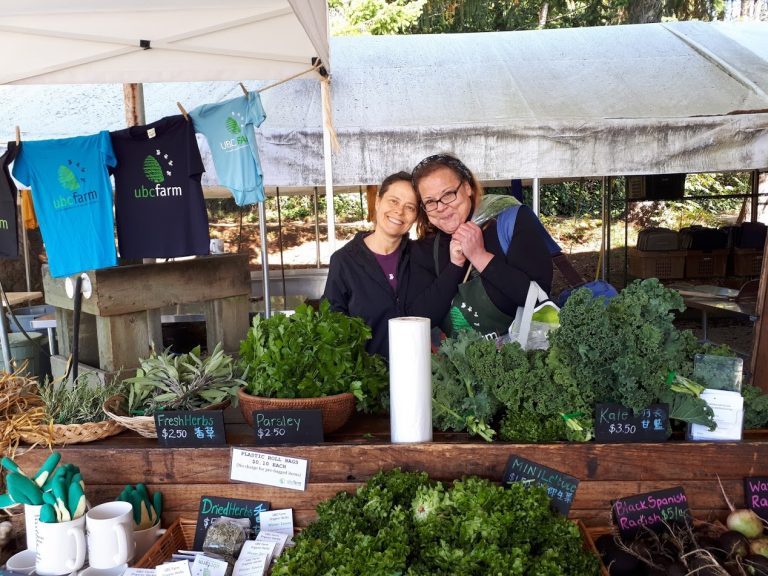
Paula, on the left, with Sara, a longtime UBC Farm volunteer who recruited Paula for our markets
I would love to hear how you first heard about the Farm and what interested you in coming out?
We moved into the UBC neighborhood back in May 2007, and through some friends we heard about the Farm. We started coming regularly to the Farm and then one Saturday morning while I was shopping another volunteer, Sara, recruited me. She said, “Well, I see that you really love what we have here at the Farm and you come here every Saturday, so would you come would you like to volunteer?” And I thought, “Whoa, that’s a great opportunity to actually spend even more time at the Farm, and with the amazing produce that’s here.” I didn’t actually know about the volunteer program. She was the first one to mention it to me. So that’s actually how I found out about the volunteering aspect of the Farm. I was shopping here for a long time, but back then I wasn’t aware of the volunteer program.
Is there anything you would say to people who are interested in volunteering at the Farm or interested in shopping at the Farm? What makes it special to you?
I just love the fresh produce. It’s seeing real food that actually touched the ground because I see so much produce in other markets that didn’t even touch the soil. Here I know everything is organic, grown in the land and it has the most nutrition value that you can possibly get. So I really love the quality. And it’s so different from what I do in terms of work. I’m with computers in my professional work so here being with food and talking to people it’s a big change for me. It’s a really nice balance.
This is your fifth season helping at the market, what’s the best or biggest change you’ve noticed over the years?
I really like how the quality is maintained or even improved throughout the years. They introduced more varieties since I started here. Like for example this year was the first year I’ve seen eggplants. Plus the fact that they got the certification of organic, because they were growing organic before when I started but it wasn’t certified. A lot of people would ask “Is this certified organic food?” and I would have to tell them “Yes, it is organic but it’s not certified.” But since last year when the farm got the certification I could actually proudly say “What you buy here at the UBC Farm is certified organic.” And having the chicken over the winter [last year], that was great! I like being able to buy eggs all through the wintertime too.
So what is it that keeps you coming back to the Farm throughout the years?
Definitely, it’s the quality of food and the people. I love the people working here. They are always cheerful and kind and thoughtful.
You can find Paula at the UBC Farm stand at our Saturday Farmers’ Market this Saturday for our final regular season market of 2018. Learn more about other market vendors and topics on our Saturday Farmers’ Market blog! These weekly market blog posts are linked from our newsletter when they are posted; to get regular updates, make sure to join our newsletter here.
Market Recipe Blog: Pumpkin Mac ‘n’ Cheese
By Salloum on October 23, 2018
Market Recipe Blog: Pumpkin Mac ‘n’ Cheese

Pumpkin Mac ‘n’ Cheese
Give your mac n’ cheese a fall twist with this pumpkin variation topped with pumpkin seeds! This would be a fantastic fall dish to serve at any dinner party, as a weeknight meal, or a lovely side for the upcoming holiday season.
Yield: 3-4 servingsRecipe
 TOPPING
TOPPING
- ½ cup roughly crushed tortilla chips
- 2 tbsp raw shelled pumpkin seeds
- ½ tsp dried parsley
- Cooking oil
- 4 cups dry macaroni (optional: use gluten-free macaroni)
- 1 russet potato, cubed
- ½ cup pumpkin puree (from one small pie pumpkin, roasted until soft and flesh scooped out)
- 1 cup shredded aged cheddar cheese OR ¾ cup + 2 tbsp nutritional yeast, divided (vegan option)
- 1 tbsp mustard
- ½ tsp garlic powder
- ½ tsp salt
- ¼ tsp freshly cracked pepper
- ½ to ⅔ cup water
Instructions
- Bring a medium-large pot of water to a boil. Steam or boil the cubed potato until fork-tender. Keep the boiling water and use it to cook your macaroni according to package directions. Drain when pasta is al dente.
- Prepare the crunchy topping by mixing crushed tortilla chips, pumpkin seeds, dried parsley, and 2 tbsp nutritional yeast. Spread this mixture onto a baking sheet, spray it with cooking oil, and toast at 375 F until golden brown, about 5 to 7 minutes.
- In a food processor, blend the cooked potato, pumpkin puree, 3/4 cup nutritional yeast, mustard, garlic powder, salt, pepper, and 1/2 cup water until very smooth. Adjust flavours and consistency as needed.
- Combine cooked pasta with sauce and mix until coated. Transfer to a serving dish and top with topping mixture. Serve while warm.
Pick up produce at any of our three weekly markets: Tuesdays 4-6:30PM at the UBC Farm, Wednesdays 11:30AM-1:30PM at the UBC Bookstore, and Saturdays 10AM-2PM at UBC Farm. Learn more about our produce and browse other recipes in our Market Recipe Blog. Recieve regular market recipes from our newsletter here.
Researcher Profile: Leonard Foster, Professor
By Salloum on October 19, 2018
Researcher Profile: CSFS Associate Leonard Foster
Professorin Biochemistry and Molecular Biology, Faculty of Medicine
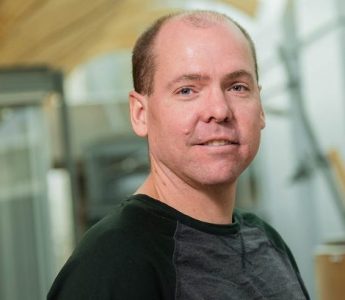
What is your research project and what is it all about?
It’s not really one project but a series of projects looking at how honey bees respond to pests and pathogens. We’re studying a number of different pests and pathogens and we’re looking at the defense mechanisms that bees have against such factors. Some of these include typical immunological defenses, as well as something called social immunity. Social immunity refers to behaviours that enable some level of disease resistance or disease tolerance. The human equivalent is like our medical system, which we build to help protect the whole society.
In bees, there are a few different known social immunity behaviours. The most obvious one is called hygienic behaviour, where some bees are better at identifying diseased or dying nest mates and removing them from the hive before the disease spreads further. Another observed behavior is called grooming, similar to the type of grooming behaviour seen in great apes, where one animal will remove pests, not so much pathogens, but mites, from the back or body of another bee. What we’re trying to do there is understand how those behaviours work and how they enable disease resistance and then try to use that knowledge to breed bees that are more disease-resistant.
What’s next for this project?
We have focused a lot on hygienic behaviour and we’re coming to the end of the line in terms of what is feasible or useful to be done at a university. At some point, hopefully, the technology we’ve developed for bee breeding will be moved into industrial use; the challenge there though is that the current test that one would need to do is probably not cost efficient for most beekeepers. The goal from the beginning, however, was not to develop a test for breeding for one trait, like hygienic behaviour, but instead to be able to make the same kind of breeding decisions for many different traits. Bee breeders can select for traits like hygienic behaviour, honey production, winter hardiness, and the level of aggression.
The benefits of such a generalized selection and screening technology can help breeders get more productive bees, or more docile ones, or even bees more resilient against natural deterrents like cold and pests. The technology that we’re using, if we can get it to work properly, will enable someone to do all of those tests for the same cost as it would be to do one of those tests! So if we get to that point where we can multi-plex all of these tests into one analysis then it becomes extremely cost efficient for industrial application and hopefully will take off even further there. We’ve been working with beekeepers to try to apply the current test but in its current state we don’t really expect it will be really widely be taken up by industry just because of the cost. We are still learning from industry also what their needs are and how we can adapt our test parameters and results for use in the broad spectrum of mainstream industry.
Why does this work matter to you?
I’ve been around bees for as long as I can remember: my parents kept bees and during my undergrad summers I worked in a bee lab at SFU. Now, my lab has a large interest in bees and it matters because bees are important for society. Bee health is currently a big concern and everybody agrees that we need to do more to improve the health of bees and the viability of the industry.
It’s also important to me because it’s a lot of fun working with bees. There is a lot to learn about bees – their behaviours are very fascinating and there is a lot of interest in bees both from beekeepers and the wider public. It’s a fun aspect of research to be able to interact with those people and teach them, and have them teach me, about bees, bee issues, and bee health–we keep informing the discussion and keeping it rational.
Why did you get into this in the first place?
When I was coming to UBC and deciding what I wanted to focus on, I looked for something that I had some background in and I had some background with bees. That said, I still wanted an area where we can also apply the technology that I was bringing to UBC which is called proteomics. The bee genome had been sequenced about the time I started here and that is a prerequisite to being able to use proteomics in an organism, so it was a good fit for a few reasons.
What surprises you about this work?
I guess it always surprises me just how interested the public gets in bee technology and that’s definitely a pleasant surprise. Bees are quite a fascinating organism and because their social structure is more advanced than human social structure, we are continually surprised at some of the things that they do. We think we know a lot about some really neat features of bee biology, but even just working with bees, you are constantly observing new things that don’t seem to follow the rules. We’re trying to figure out why that is and that’s just a lot of fun!
Bees are ranked as eusocial, which is basically one level higher on the ladder than humans. The main reason for this higher ranking is that most of the members of a bee society give up their right to reproduce, whereas in humans, everybody, apart from those with medical problems, retains the ability to reproduce. Worker bees give up their ability to reproduce in order to give their queen a better chance of passing on her genes to future generations. They do other things that are more altruistic, again much more so than you would see in a normal human society.
How important is the Centre for Sustainable Food Systems at UBC Farm to your work?
It’s quite important to our work: we do work on a lot of different scales, from experiments in the lab up to large field trials. The Farm is not so useful for large field trials because it’s relatively small compared to modern agriculture but it is big enough to support five or six or eight colonies and then we can do some small colony level trials there. The Farm is also immediately accessible to the lab, which is probably its most important feature for us, especially since UBC is located well away from any other agricultural land. But even then, we haven’t really taken advantage of it in a formal way. That said, having other researchers around the Farm asking different questions about aspects of farming like urban farming allows us to ask questions about how bees can fit into urban settings. It also helps shed some light on how bee management practices can work with the other needs of a small urban farm to improve productivity or public engagement.
What’s your favourite thing to do at the UBC Farm?
Beekeeping! Just standard bee management. Being in the department I am in, one expects to be in the lab all the time. My research program allows me to get out to do some beekeeping with my graduate students. In part, beekeeping gets me out of the lab and offers a different environment where you can just have a good talk about science and bees.
Saturday Market Vendor Feature: Darsana Tea
By rachel ma on October 18, 2018
Saturday Market Vendor Feature: Darsana Tea
This week, we will be featuring Darsana Tea, which is a one-person business started by Renée Fulsom right here in Vancouver just a year ago specializing in 7 different Chakra blends of tea that you can get in your favourite tea base!
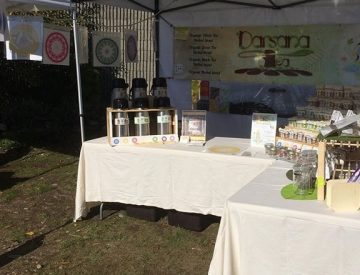 What is included in your Chakra blends?
What is included in your Chakra blends?
7 ingredients of fruits, roots, flowers, leaves, plus a base of dark, white, green or nettle tea cupped together. All together, we have 28 different types of teas for you to pick from!
What are the 7 chakras?
The first is wisdom (crown chakra), which is how you perceive the world. Vision (3rd eye chakra)- the lens which you view the world. Voice (throat chakra)- power of how you create your world. Love (heart chakra)- connection with universal consciousness (solar plexus chakra). Service- generosity, harmony, and balance. Freedom (seal of soul chakra)-forgiveness of self and others. Ascension (root chakra)- grounded, and being as one.
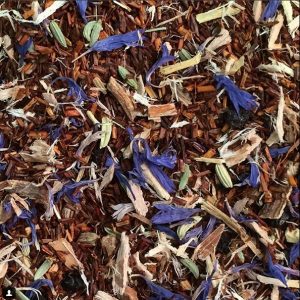 What’s different about Darsana Tea that you won’t find in other tea companies?
What’s different about Darsana Tea that you won’t find in other tea companies?
We source our teas from organic suppliers and packaging that is environmentally friendly, compostable/reusable/recyclable, ethically sourced, and with a small footprint, which was hard because pretty much everything manufacturing wise has been sent to China.
What’s your favourite of them all?
I can’t pick just one. I created all of them and love all of them. They are all my favourites.
Where can I purchase your teas?
We were at 5 farmers markets in Vancouver this season, including UBC Farm. We still have one more date at Riley Park Saturday Farmers Market on Oct 27th, but after the market season, our website continues to be open year-round for you to purchase our teas!
If you want to learn more about Darsana Tea Company, check them out on instagram, facebook, or their website. You can see all of their upcoming dates at the UBC Farm Market here. Learn more about other market vendors and topics on our Saturday Farmers’ Market blog! These weekly market blog posts are linked from our newsletter when they are posted; to get regular updates, make sure to join our newsletter here.
Market Recipe Blog: Autumn Squash Salad
By Joyce Liao on October 16, 2018
Market Recipe Blog: Autumn Squash Salad
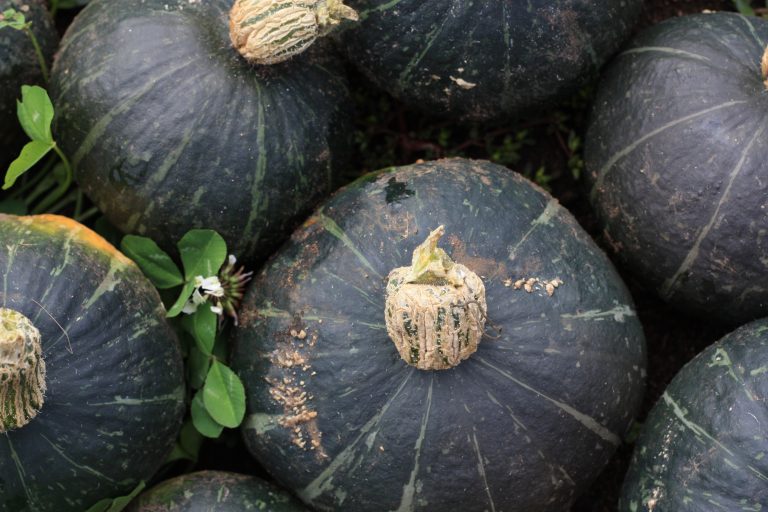
Autumn Squash Salad
Salads do not have to be boring, or as one of my friends call it, “crunchy water”; nobody likes a plate of crunchy water! Fall is here, so this means squash of all colours, sizes, tastes, and textures are available at the market… and what better way to enjoy their sweet flavour than to feature it front and center in an autumn salad?
Yield: 2 as a main, 4 as a sideRecipe
 SALAD
SALAD
- ½ small kabocha, kuri or hubbard squash, sliced
- Oil, salt & pepper for roasting
- 3 big handfuls of mixed greens
- 1 apple, finely sliced
- About ½ cup finely sliced red cabbage
- Juice of ½ a lemon
- 2 tbsp olive oil
- 2 tsp honey or maple syrup
- 1 tbsp Dijon mustard
- ½ shallot, finely minced
- A pinch each of sea salt and black pepper
Instructions
- Preheat oven to 400°F and line a baking sheet with parchment paper. Toss sliced kabocha squash in a drizzle of oil and a dash of salt and pepper. Arrange in a single layer on prepared baking sheet and roast for 30 minutes, or until browned and easily pierced with a fork.
- To make the dressing, add all dressing ingredients into a small jar and shake to combine.
- To assemble, toss mixed greens with red cabbage, sliced apples, roasted squash, and dressing to taste. Garnish with crumbled pieces of oat crackers.
Pick up produce at any of our three weekly markets: Tuesdays 4-6:30PM at the UBC Farm, Wednesdays 11:30AM-1:30PM at the UBC Bookstore, and Saturdays 10AM-2PM at UBC Farm. Learn more about our produce and browse other recipes in our Market Recipe Blog. Recieve regular market recipes from our newsletter here.
Oct. 10: Infant food insecurity in Canada: The breastfeeding paradox, politics of infant food charity, and second-hand baby food environments with Lesley Frank
By rachel ma on October 10, 2018
Oct. 10: Infant food insecurity in Canada: The breastfeeding paradox, politics of infant food charity, and second-hand baby food environments with Lesley Frank

Wednesday, October 10, 2018, 12:30 p.m. – 1:30 p.m. Liu Institute for Global Issues – Multipurpose Room, 6476 NW Marine Drive.
Join us for Infant food insecurity in Canada: The breastfeeding paradox, politics of infant food charity, and second-hand baby food environments with Lesley Frank, Associate Professor of Sociology, Acadia University.
Dr. Lesley Frank is an Associate Professor of Sociology from Acadia University and a Visiting Associate professor in the Faculty of Land and Food Systems. In this talk, Dr. Frank will share insights from a number of her projects on Infant Food Insecurity in Canada. She will describe several key issues related to the topic, such as the relationship between household food insecurity and breastfeeding outcomes, the threats to breastfeeding in a sustainable food system, the challenges of finding formula when infant feeding politics trumps infants’ right to food, and the resulting quest for infant food in the second-hand goods economy on-line. Collectively these issues reveal serious problems of unequal food access, potential food risk, and food inequities that are unique to families and infants in food insecure households.
Dr. Frank researches primarily in the areas of child and family poverty, food insecurity, infant feeding, and social welfare policy. Dr. Frank is a leading emerging scholar in the area of infant food insecurity in Canada with research published in the Journal of Food, Culture and Society, Food and Foodways, Canadian Food Studies Journal, and Canadian Medical Association Journal.
This event is co-sponsored by the School of Public Policy and Global Affairs.
Market Recipe Blog: Carrot Cake Truffles
By Joyce Liao on October 9, 2018
Market Recipe Blog: Carrot Cake Truffles

Carrot Cake Truffles
Sometimes, we want carrot cake but simply don’t have time to whip up a batch of carrot cake muffins in the oven. If you don’t have access to an oven, and need a healthy afternoon pick-me-up and satisfy your sweet tooth all at once, this recipe is perfect for you! These truffles may or may not beat the usual carrot-sticks-with-ranch-dip-in-a-ziploc-bag, and it’s your call to find out!
Yield: 16 trufflesRecipe

- ½ cup unsweetened medium shredded coconut, plus extra for decorating
- 1 cup walnuts
- 2 carrots
- 2 tsp cinnamon
- A pinch each of nutmeg, ginger, and salt
- About 10 large Medjool dates, pitted*
- 1 tbsp molasses (optional)
Instructions
- Toast walnuts and shredded coconut in a preheated 300°F oven until golden brown. About 10 minutes but varies depending on your oven.
- Using a grater or a food processor, shred carrots. You will need about 2 cups. Use a thin cloth (ideally a cheesecloth) and squeeze out all excess liquid over a bowl.
- Drink the super sweet carrot juice! Yes, this is part of the procedure.
- Add walnuts to food processor, fitted with a blade, and pulse a few times until chopped into rough chunks. Add coconut, carrots, and spices. Process until combined; scrape down with a spatula if necessary.
- Add pitted dates and molasses and pulse until thoroughly combined.
- At this point, test the consistency of the mixture by pressing between your fingers. If it is too crumbly, add more dates or water or molasses, anything wet. If its too dry, add more coconut or nuts.
- Using a cookie scoop to measure, roll dough into round balls with hands.
- Roll finished truffles into extra toasted coconut, chopped nuts, dunk into melted white and/or dark chocolate (a handful of chocolate chips + 1 tsp of coconut oil, melted together; use vegan chocolate as needed), or sprinkle with additional cinnamon. Store Carrot Cake Truffles in refrigerator, that is, if you don’t eat them all…
Pick up produce at any of our three weekly markets: Tuesdays 4-6:30PM at the UBC Farm, Wednesdays 11:30AM-1:30PM at the UBC Bookstore, and Saturdays 10AM-2PM at UBC Farm. Learn more about our produce and browse other recipes in our Market Recipe Blog. Recieve regular market recipes from our newsletter here.
Saturday Market Vendor Feature: The True NOSH Company
By rachel ma on October 9, 2018
Saturday Market Vendor Feature: The True NOSH Company
The True NOSH Company is in their second year selling at our market with a diverse line of drinks, treats, sauces and more that are flavourful and diabetic-friendly. We talked to Iris about their origin story, what motivates them, and why their business is so connected to UBC’s Faculty of Land and Food Systems. We also had the chance to interview a loyal True Nosh customer to find out just why their granola is so addictive! Read on to find out more.

Founder Renee Chan
What inspired True Nosh?
The founder is Renee Chan. I’m one of her employees, Iris. What inspired True NOSH was her dad struggling with diabetes and trying to find ways to eat while maintaining his health. So as a registered dietitian, she decided to create a food line that would be as guilt-free as possible and healthy while still having flavour and a traditional touch from their heritage.
Is everything made in Vancouver?
Yes, we make everything in Vancouver. Our commercial kitchen is in Burnaby at YVR Prep.What brought you guys to UBC Farm?
I did! I’m an LFS student and I really like the farm, and I’ve seen the farmers market and I really like the environment of this particular farmers market. It’s just very friendly and it’s great to be outside. Plus it’s very affordable for us to come here. So for a start up like ours, it’s really nice to be able to have lower stakes every time we come to the market, so we are able to sell our products and share them with the community.

True Nosh’s table at the market
What’s your most popular product?
That’s a hard one, but I think it’s the granola. It’s also one of my favourites!
If you could describe True Nosh in three words, what would they be?
Punny- the labels of our products are all based on puns. Our hot sauce line is called “hot dates” because our hot sauces are sweetened with dates, and all our other sauces also have really punny labels! The other words would be Healthy and Delicious.
What would you like customers to know about your business?
I think what Renee would like them to know is the passion that is involved in the production of our products. We really try to make sure that we listen to our clientele, and keep things fun and delicious, and as innovative as possible.
So none of the products you sell have any added sugars?
Yes, we do everything with just fruits and vegetables. Any sort of sweeteners would come from fruit, savoury would come from vegetables or spices. Just whole ingredients! For example, our granola is completely date-sweetened, and our sweet and sour sauce is sweetened with pineapple and cherries!
What’s your favourite sauce that you have here?
Black bean! That one actually has a nice story to it because myself and another previous employee here (we’re both LFS students), and along with a couple other LFS students, we co-created the sauce and entered it to the Pulse competition and won second in BC! That was really cool, and Renee had a lot of input for us and really helped and guided us.
After our interview with True NOSH, a regular customer of theirs, Greg, came by and wanted to share a few words about the business and his favourite product!

The famous goji berry granola!
What’s your favourite thing about True NOSH?
The granola is amazing for sure, but I think overall how the company is organized and how they operate with the sense of all the right ingredients, all the right spirit… so I’m hooked. You have to love the product in order to be hooked to it, but for me it just happened instantaneously.
Do you know Renee?
I’ve gotten to know her. So over the last year, every month I’d pick up granola at their office and I’m on the “granola hookup”, so I pay for a year’s worth of granola, and I just go pick it up every month.
Is the “Granola hookup” exclusive?
No I was just the first one who started it because on one of their last farmers market of the season, I came up to them and said ‘I really love your granola. How can we figure out something so I can have regular access to it?’, and we just figured out the logistics from there. They have a couple other customers on the hookup as well now! It’s brilliant; if you want to find out more, look on their website!
Any other words you want to share?
I think we all need to be smart in our food shopping and all trying to find great products that align with what we value, so this is why I come here. Pay a little extra more, but what I find with the granola and the other products at True NOSH is that the price point is great, and when you shop around, what they put into it is fantastic, and I have sweet teeth (not just one), and this granola is just sweetened in a way that just works for me.
You really LOVE the granola! How do you like to enjoy it?
I’m trying not to be addicted to the point where I burn out on it, but during the day, I would just pop a handful as a snack, but normally I’d like to eat it in a bowl with some peaches and blueberries, some milk. My sons love it too! You just gotta try it! … hahahah do I sound like a part of the team?
If you want to learn more about the True Nosh Company, check them out on instagram, twitter, facebook, or their website. You can see all of their upcoming dates at the UBC Farm Market here. Learn more about other market vendors and topics on our Saturday Farmers’ Market blog! These weekly market blog posts are linked from our newsletter when they are posted; to get regular updates, make sure to join our newsletter here.
Oct. 3: The Emancipatory Politics of Food Sovereignty with Annette Desmarais
By Salloum on October 3, 2018
Oct. 3: The Emancipatory Politics of Food Sovereignty with Annette Desmarais
Wednesday, October 3, 2018 12:30 p.m. – 1:30 p.m. Macmillan Building – Room 350, UBC

Dr. Annette Demarais
By analyzing how food sovereignty is conceptualized and practiced in the Basque Country, this presentation will explore what kind of global political project food sovereignty seeks to build and mobilize. This case highlights the significance of building solidarities from below and across space in struggles for transformative social change.
About Dr. Desmarais:
Annette Aurélie Desmarais is Canada Research Chair in Human Rights, Social Justice and Food Sovereignty. She is the author of La Vía Campesina: Globalization and the Power of Peasants (2007) that has been published in French, Spanish, Korean, Italian and Portuguese. She also co-edited Food Sovereignty: Reconnecting Food, Nature and Community (2010) and Food Sovereignty in Canada: Creating Just and Sustainable Food Systems (2011). Prior to obtaining her doctorate in geography, Annette was a small-scale cattle and grain farmer in Canada for fourteen years. She also worked as technical support to La Via Campesina for a decade and continues to conduct participatory research with member organizations of this transnational agrarian movement.
This talk is presented by the Centre for Sustainable Food Systems.